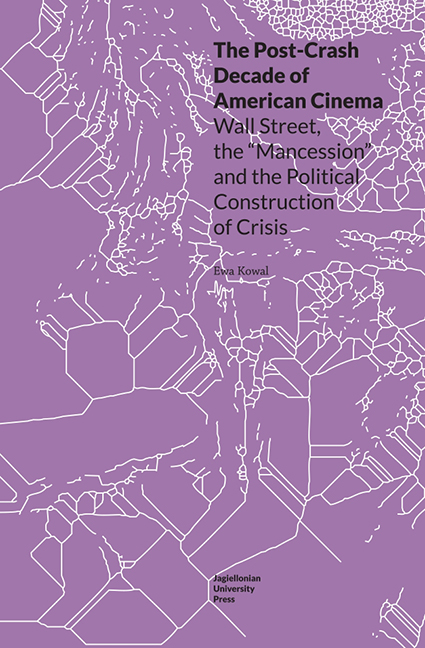 The Post-Crash Decade of American Cinema
The Post-Crash Decade of American Cinema CHAPTER FIVE - Home in 99 Homes and The Florida Project: Women and Children Last
Published online by Cambridge University Press: 05 May 2023
Summary
In this final chapter, all the prominent elements which have been discussed or at least signalled so far will reappear – either repeated or modified: a Gekkoesque father figure and the father-son relationship, the male breadwinner, the construction worker, power tools, guns, men's suicides, the mother(-stripper)-whore “spectrum” available for female characters, and a child character – now fully developed for the first time. But the most prominent element also belonging to this catalogue which still needs to be explored is home.
Thus far in outlining the historical systemic causes leading up to the 2007/8 financial meltdown, our attention has focused on the 20th century, i.e. on the shift from the post-WWII economic period to the post- 1980s corporate and neoliberal capitalism in the US. However, new contributing factors responsible for the housing bubble which resulted in the global financial crisis were added at the very beginning of the 21st century.
The new millennium began with the bursting of the previous – dot.com – bubble in the year 2000, but, more importantly, with the September 11, 2001 terrorist attacks and the ensuing crisis. In her 2007 book The Terror Dream. What 9/11 Revealed about America, Susan Faludi analyses how 9/11 was culturally processed and “domesticated,” i.e. how the US politicians and mainstream media constructed “the threat” as one that “wasn't to our commercial and governmental hubs but to our domestic hearth” (5). Consequently, the author asked, “Why did we perceive an assault on the urban workplace as a threat to the domestic circle? Why were we willing ourselves back onto a frontier where pigtailed damsels clutched rag dolls and prayed for a male avenger to return to the home?” (ibid., 7), and “What if the nation had responded to 9/11 differently? What if we hadn't retreated into platitudes and compensatory fictions?” (ibid., 295).
The questions put forward by Faludi already signal her thesis. To propose it, Faludi drew upon the 19th-century German zoologist Ernst Haeckel's hypothesis that “ontologeny recapitulates phylogeny” (ibid., 13), i.e. that “an embryo, as it develops repeats in compressed form the evolutionary stages of its species” (ibid.) – which idea, even if no longer applied literally by modern biology, nonetheless “retains a metaphorical power in the realm of cultural history” (ibid.).
- Type
- Chapter
- Information
- The Post-Crash Decade of American CinemaWall Street, the 'Mancession' and the Political Construction of Crisis, pp. 165 - 196Publisher: Jagiellonian University PressPrint publication year: 2021
